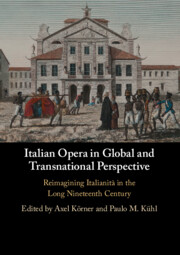 Italian Opera in Global and Transnational Perspective
Italian Opera in Global and Transnational Perspective Early South American Experiences of Italian Opera Singers (1840–1860)
Published online by Cambridge University Press: 17 March 2022
The importance of opera and operatic practices to nineteenth-century Latin American culture has been widely acknowledged; opera was central to the construction of ideas about liberalism, Europeanism, cosmopolitanism and the all-encompassing notion of 'civilisation'. The centrality of opera and of opera houses in the region, however, often obscures the ways in which opera, and Italian opera in particular, were being read. Taking account of the multiplicity and heterogeneity of operatic experiences in the region, the chapter examines the experience of Italian opera singers in the southern Andes (Chile, Peru, Bolivia and Ecuador) during the 1840s, a period of major expansion of opera throughout Latin America. Often these singers were the first to perform opera in the region. How did they live the experience of being Italian and singing Italian opera in South America? Based on newspapers, archival documents and private letters, the chapter demonstrates how, for many of these singers, producing opera in Latin America was neither marked by a direct projection of their previous Italian experiences, nor was it seen as an exotic transatlantic adventure. Instead, it was something in between: a constant process of negotiation between their private and public identities.
To save this book to your Kindle, first ensure [email protected] is added to your Approved Personal Document E-mail List under your Personal Document Settings on the Manage Your Content and Devices page of your Amazon account. Then enter the ‘name’ part of your Kindle email address below. Find out more about saving to your Kindle.
Note you can select to save to either the @free.kindle.com or @kindle.com variations. ‘@free.kindle.com’ emails are free but can only be saved to your device when it is connected to wi-fi. ‘@kindle.com’ emails can be delivered even when you are not connected to wi-fi, but note that service fees apply.
Find out more about the Kindle Personal Document Service.
To save content items to your account, please confirm that you agree to abide by our usage policies. If this is the first time you use this feature, you will be asked to authorise Cambridge Core to connect with your account. Find out more about saving content to Dropbox.
To save content items to your account, please confirm that you agree to abide by our usage policies. If this is the first time you use this feature, you will be asked to authorise Cambridge Core to connect with your account. Find out more about saving content to Google Drive.